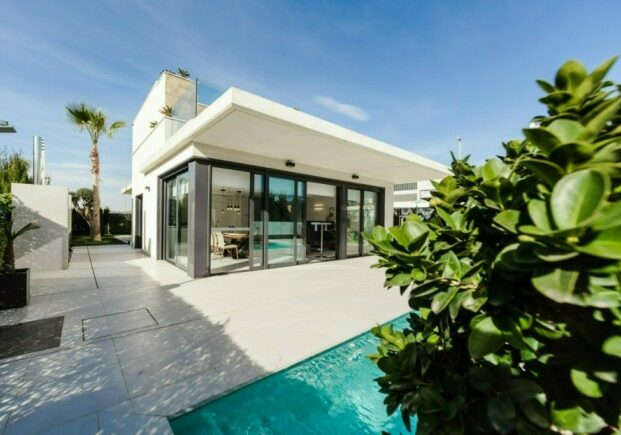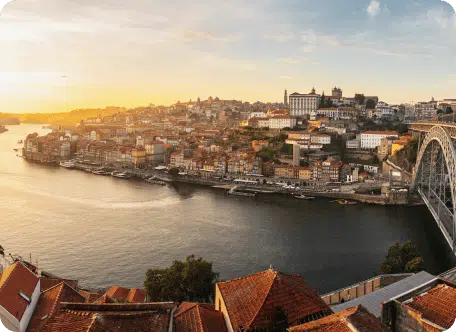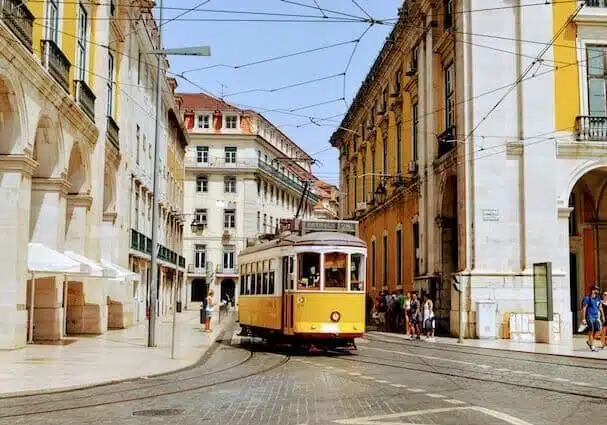Updated: June 25, 2025
What is the cost of living in Portugal in 2025? Is it expensive to live in Portugal?
You may ask these questions if you’re considering living in Portugal.
Fortunately, if you’re traveling from an expensive city in the US, Canada, or the UK, you’ll find your money stretches a lot further in Portugal, especially when it comes to healthcare, housing, and food. Offering the lowest costs of living in Western Europe, the estimated monthly costs in Portugal are about €1,200 – €2,500, but this will largely depend on your lifestyle and where you choose to live.
According to Numbeo, the average cost of living in Portugal is 28.6 percent less than in France and 28.5 percent cheaper than in Germany. When it comes to the cost of living in Spain vs Portugal, the average living cost in Spain is 4.7 percent higher.
Despite its affordability, Portugal maintains a high quality of life, consistently ranking among the best in global quality-of-life indexes. For example, the country is ranked in the 6th position in Global Citizen Solutions’ Quality of Life Index.
In this article, we’ll break down the cost of living in Portugal, covering everything from rent and groceries to everyday living expenses, helping you navigate life in one of Western Europe’s most budget-friendly destinations.
The Cost of Housing in Portugal
The cost of housing in Portugal remains affordable by Western European standards, although prices have been rising in key areas, such as Lisbon, the Algarve, and Porto. Currently, the average asking price for a property in the Lisbon Metropolitan Area is €4,935 per square meter, while in the Porto Metropolitan Area and the Algarve, it stands at €3,937 and €4,385 respectively.
However, more budget-friendly options can be found in Portugal’s central, northern, and Alentejo regions, where property prices are significantly lower. Given these factors, many expats consider buying property a better long-term investment than renting. Our Portugal House Prices guide offers a better overview of house prices across the country.
Renting remains a practical option for those not ready to purchase a home. Rental prices vary widely, with a one-bedroom apartment in central Lisbon averaging €1,388 per month, while more affordable options exist outside the city center at around €1,075. Smaller cities and rural areas offer significantly lower rents.
Utility Costs in Portugal
After drawing up a budget for your housing costs and properties, you need to monitor your utilities and home service expenses. Utility bills, including electricity, water, and internet, are typically lower than in many other European countries.
The utilities include heating, water, electricity, garbage collection, mobile tariff, internet, and much more. Numbeo suggests that the combined cost of utilities come to around €115 a month in an 85m² apartment. If you want to know how affordable this is, you need to check the same living expenses with other countries. For instance, in the UK, this is about €240.
If you live in southern Portugal, you will likely want to have air conditioning during summer, which increases your electricity bill. In general, you might need to heat the apartment during Portugal’s mild winter, as houses can get pretty cold in the winter months. You will want to factor these two things into your Portugal living cost.
Here are the average monthly utility costs in Portugal, which might vary based on your usage.
Electricity and Bills expenses | Portugal’s Cost Per Month |
Cost of electricity, water, gas, and garbage collection | €115 |
Local mobile phone monthly plan with calls and 10GB data | €19 |
Internet packages (unlimited data, 60Mbps or more, cable/ADSL) | €37 |
Transportation Costs in Portugal
Portugal is one of the most beautiful countries in Western Europe, with stunning beaches, incredible food, wine, and picturesque towns. It would be a shame not to explore it all. Fortunately, the public transport costs are fairly affordable in and around Portugal.
Public transportation is well-developed and affordable, with a monthly pass costing around €40.
The petrol cost is slightly expensive in Portugal, costing €1.70 per liter. You can find affordable taxi fees, although Uber and Bolt offer even cheaper fares. The average taxi fee is €3.50 and increases by €0.99 per kilometer.
In 2023, Portugal also became one of the latest European countries to introduce a cross-country train ticket to boost sustainable travel. The monthly pass costs €20 and allows unlimited journeys on Portugal’s regional trains.
Suppose you prefer the convenience of having your own car in Portugal, you will be happy to know that a new or equivalent quality Volkswagen Golf 1.4 90 KW Trendline car costs €30,000. This is cheaper in Portugal than it is in other European countries like Spain, where the same care will cost you €33,365.
Cost of Dining Out in Portugal

Portugal has a reputation for incredible food and wine, with delicious fresh seafood. You can enjoy high-quality food without the premium price tag, which is usually the case in other countries in Western Europe.
You can eat a regular solid meal in an inexpensive mid-range restaurant in Portugal for €8-€15 and a drink or two at a reasonable price. A glass of wine for €3 and a beer for around €2.
For more information on dining out costs, refer to the below table:
Item | Cost (in Euros) |
Meal at an Inexpensive Restaurant | €11 |
Three-Course Meal for Two (Mid-Range) | €45 |
Domestic Beer (0.5 liters) | €2.50 |
Imported Beer (0.33 liters) | €3 |
Cappucino (regular) | €1.85 |
Water (0.33 liters) | €1.20 |
Coke/Pepsi (0.33 liters) | €1.69 |
Everyday Food Bills and Expenses in Portugal
When you are not eating out, you will require some basic essentials at home to cook for yourself. Taking the cost of living in Portugal for a single person into account, the grocery costs are reasonable. A typical monthly grocery bill for a single person will range from €150 to €350, depending on lifestyle and location.
Portugal’s long coastline also makes fish prices highly affordable.
Below is a detailed list of essentials and their average cost.
Item | Cost (in Euros) |
Milk (regular, 1 liter) | €0.94 |
White rice (1kg) | €1.40 |
Local cheese (1kg) | €10.31 |
Loaf of fresh white bread (500g) | €1.36 |
Eggs (regular, 12) | €2.68 |
Beef round (1kg) | €12.50 |
Chicken fillet (1kg) | €6.69 |
Banana (1kg) | €1.28 |
Apples (1kg) | €1.94 |
Oranges (1kg) | €1.61 |
Potato (1kg) | €1.49 |
Tomato (1kg) | €2.18 |
Onion (1kg) | €1.74 |
Lettuce (1 head) | €1.39 |
Cigarette (20 pack, Marlboro) | €5.50 |
Source: Numbeo
Healthcare Costs in Portugal
According to the latest ranking of the world’s health systems by the World Health Organization, Portugal ranks 12th. Portugal also ranks 23rd in the world on the 2024 World Index of Healthcare Innovation.
There are two categories of healthcare systems in Portugal, namely, public healthcare and private healthcare. Public healthcare, SNS, is almost free for all Portuguese citizens and legal residents. There will be healthcare costs associated with selected procedures, which include visiting a family doctor, the emergency room, or taking a diagnostic examination. The fee can be anything from €5 to €20. The diagnostic exams cost no more than €40.
Private healthcare in Portugal is more expensive than the public healthcare system. However, both private medical services and private health insurance are still quite affordable, especially when compared to the USA.
Private health insurance varies depending on your insurance plan. There are different types of private health insurance plans in Portugal, and you’ll need to choose one that suits you the best. The prices of private insurance, on average, are around €400 a year. Prices can go as high as €1,000 when you choose a more comprehensive insurance plan.
Without private health insurance, you’ll have to pay an average of €40 to €50 for a private doctor’s appointment.
Cost of Leisure Activities in Portugal

They even made an initiative to install “Parque Ambiental”, which are parks for recreational activities, such as walking, climbing walls, bicycle routes, and other endeavors.
If you are a movie buff, the country has a lot of movie theaters, where they show English language movies in the original language with Portuguese subtitles.
Here are some of the sports and leisure activities in Portugal and their average cost:
Item | Cost (in Euros) |
Fitness Club (Monthly fee for one adult) | €38.19 |
Cinema International Release (1 seat) | €7.50 |
Tennis Court (One hour in a weekend) | €14 |
Cost of Childcare in Portugal
In Portugal, public schools offer basic education for free to both citizens and foreign residents until the students are nine years old. Lessons are taught in Portuguese.
If you opt for a private school, you must pay the required amount for the education.
Private schools charge between €400 and €500 per month from primary to high school, which does not include the enrollment fee and book fees. Portugal also has English-speaking international schools, where the fee is around €800-€1,800 per month (varies per school), in addition to the enrollment fees, books, uniforms, etc.
Cost of living in Portugal vs USA

The cost of living in Portugal vs the USA is over 34 percent cheaper, allowing American nationals access to a higher quality of life than they would be able to afford back home.
Everything from housing, groceries, and dining out to healthcare and education tends to cost less, especially if you’re coming from a major US city.
Here are some cost comparisons to put the differences into perspective, according to the latest price averages on Numbeo:
- Housing prices are 38-45 percent cheaper in Portugal compared to the USA.
- Food (groceries) are 30-60 percent cheaper in Portugal compared to the USA.
- Dining out costs are 32-38 percent cheaper in Portugal compared to the USA.
- Healthcare in Portugal is mostly free or at a very minimal cost in the public system and 100-300 percent cheaper for private healthcare services compared to the USA.
- Education is 45-65 percent cheaper in Portugal compared to the USA.
- Public transport is about 30 percent cheaper in Portugal compared to the USA.
- Monthly utilities are 38 percent cheaper in Portugal compared to the USA.
- Mobile phone and internet costs are 41-63 percent cheaper in Portugal compared to the USA.
A Sample Budget for a Single Person Living in Portugal
For a better idea of how to plan your budget when moving to Portugal, here is a sample monthly budget mapping out the average monthly cost of living in Portugal for single person expats.
For this example, we are using the rental cost of an apartment outside of Lisbon city center.
Expense | Cost (€) |
Rent (one-bedroom apartment) | €1,075 |
Utilities | €115 |
Internet and mobile phone | €56 |
Private health insurance | €40 |
Public transport | €40 |
Groceries | €250 |
Entertainment (Dining out, cinema tickets, etc.) | €50 |
Gym membership | €38 |
Total | €1,664 (or around $1,875) |
Cost of Living in Portugal: Final Thoughts
So, is Portugal cheap? The cost to live in Portugal is, in many ways, much more affordable than in other Western European countries. From utilities to healthcare, you’ll likely find that your money stretches further.
If you’re considering a move to Portugal, our partner, Global Citizen Solutions, will be able to offer you expert advice and guidance on your journey to moving to Portugal. Global Citizen Solutions is a multidisciplinary firm offering bespoke residence and citizenship solutions in Europe and the Caribbean.
Here at Goldcrest, we also offer you expert advice and personalized guidance to finding your dream home in Portugal at an affordable price. From providing you with access to exclusive property listings to negotiating the best prices, we ensure all your requirements are met and your needs are treated as our only priority.
If you’d like to know more, feel free to reach out to us by filling out the contact form below, and we’ll be in touch.
Frequently Asked Questions About Portugal Cost of Living
Is Portugal expensive to live in?
Being the most affordable country in Western Europe is one of the top ten reasons to move to Portugal. For a family of four, you’ll need about €2,424, excluding rent, while the cost of living in Portugal for a single person is €685, excluding rent. On average, consumer prices in Portugal are almost 37 percent lower than in the USA. Average rent prices in Portugal are 47 percent lower than in the United States.
The cost of living in Portugal for a single person is a bit more expensive in Porto or Lisbon, where you’ll need about €1,200 to €1,500 a month. However, you can get by on way less in smaller towns or in lesser-known areas. For example, the cost of living in Guarda, a stunning city in Central Portugal, will be much more affordable than moving to Lisbon.
Can you live in Portugal on $2000 a month?
You can live comfortably in Portugal on $2,000 a month, which amounts to €1,848, well above the Portuguese minimum wage. According to Numbeo, a one-bedroom apartment in Lisbon or Porto city centre will cost about €1,000 – €1,400, and grocery prices at local markets are available at a reasonable cost and should come well within your budget if you spend it wisely. In the smaller and rural areas, you can live very comfortably on this budget, too.
Is healthcare free in Portugal?
The public healthcare system is mostly free for residents and Portuguese citizens. However, you need to pay a small amount for a few procedures, such as diagnostic examinations, visiting a certain doctor, or visiting the emergency room.
What is the average cost of living in Portugal?
It depends greatly on your lifestyle and the city you choose to live in. The estimated monthly living expenses for a family of four are €2,424, excluding rent. The monthly cost of living in Portugal for a single person is estimated to be €685, also excluding rent.
However, the average salary in Portugal is low, but the affordable cost of living makes up for the low income. The average monthly salary after taxes comes to around €1,200, and many locals in Portugal get by with less than €800 a month. Additionally, the cost of living for a couple in smaller cities in Portugal is around €1,700, while living in a major city like Lisbon will cost upwards of €2,000 a month.
What is the cost of living in Portugal for a family of four or a couple?
According to Numbeo, the cost of living in Portugal for a family of four can be around €2,424, excluding the rent. This means a family of four can live comfortably on around €3,700-€5,000 per month, including housing costs, depending on the location and lifestyle.
A couple can live comfortably in Portugal on €1,700–€3,000 per month, depending on the location and lifestyle.
Before you take the leap, reach out to online communities or an acquaintance living in Portugal as an expat. You can seek advice on the lifestyle Portugal offers and ask for information to help you create a sample monthly budget based on Portugal’s costs compared to your low-cost living in your home country
What is the average income in Portugal?
In 2025, the average monthly salary in Portugal is estimated to be around €1,200, with a minimum wage of €870. Considering this income range, the cost of living in Portugal vs USA is still exceptionally affordable as Portugal offers significantly low-cost rent prices, transport prices, restaurant prices, school costs – including public and private universities – and general living costs.
How much money do you need to live comfortably in Portugal?
Portugal has one of the lowest costs of living in Western Europe, where a couple can enjoy a comfortable lifestyle for €1,700 to €3,000 per month, depending on where they choose to live and their personal lifestyle and spending needs.
A single person typically spends around €1,200-€2,500 per month, including rent, though living expenses vary by location, with living costs being higher in major cities such as Lisbon and Porto, and in the Algarve region in the south of Portugal.
How much is rent in Portugal in US dollars?
According to Numbeo, rent prices in the United States are 43.3 percent higher than in Portugal. The cost for rent in Portugal in US dollars is $1,050 (€931) for a single-bedroom apartment in a city center, while a single-bedroom apartment will cost $830 (€736) outside a city center. Bear in mind that this is the national average, and prices will vary greatly depending on the region within Portugal.
Is it posible to live in Portugal on $3,000 a month?
Yes, it’s possible to live comfortably in Portugal on $3,000 a month, but this will depend on your lifestyle and location. Typically, this budget covers basic needs like accommodation, food, transport, and utilities. However, pricier regions might demand stricter financial planning to maintain a comfortable standard of living.
How expensive is Portugal compared to other countries in Western Europe?
Portugal is generally more affordable than most Western European countries, with lower housing, dining, and transportation costs. For example, the average cost of living in Portugal is 29.1 percent less than in France.
Bear in mind, however, that wages are lower in Portugal than in other Western European countries. Lisbon and Porto are more expensive than smaller towns but remain competitive compared to major European capitals.
What is the cost of living in Portugal vs USA?
When comparing the cost of living in Portugal vs USA, Portugal is significantly cheaper. The cost of living in Portugal for a single person (monthly cost) without rent is around €685 ($771). In comparison to Washington DC, Lisbon is approximately 42.8 percent cheaper overall.
How can I move to Portugal?
For non-EU/non-EEA/non-Swiss citizens, you will need to secure a visa, such as the D7 Visa (for retirees and passive income earners), the Digital Nomad Visa (for remote workers) or the Golden Visa (for investors), although there are several other residency options on the table. EU citizens can move freely. Consulting an immigration expert, such as Global Citizen Solutions, helps streamline the process.
What are the pros and cons of living in Portugal?
Portugal has seen hundreds of expats relocate to the country over the last decade. Below are some of the pros and cons of living in Portugal.
- Pros: Exceptionally affordable cost of living, excellent climate, high safety, good healthcare, and welcoming locals.
- Cons: Lower salaries, bureaucratic processes, limited job market in certain industries, and occasional language barriers outside major cities.
What is the cost of living in Portugal for a couple?
A couple can live comfortably in Portugal on €1,700–€3,000 per month, depending on the location and lifestyle. Lisbon and Porto are pricier, although still fairly affordable compared to other European destinations, while smaller towns or rural areas offer more affordable living options. Healthcare and dining out stand out as extremely affordable compared with the USA and other Western European countries.
What is the cost of living in Portugal for international students?
The cost of living in Portugal for international students depends on the city they choose to study in. International students can expect to spend €800–€1,500 per month, depending on rent and lifestyle. Student housing or shared apartments cost €300–€700 depending on the location. Dining, transport, and entertainment are also affordable compared to other Western European countries.
Portuguese public and private universities in Portugal offer some of the most affordable degrees in Europe, and it is a very good place to improve your Portuguese language skills. Even though the tuition fees are cheap, you are required to cover other costs during your stay, such as food, accommodation, study materials, and so on.
Are utilities and internet expensive in Portugal?
The cost of utilities in Portugal, including electricity, water, gas, and garbage collection, is around €115 per month. This is quite affordable as, in the UK for example, this would cost around €240.
What are the average childcare and education expenses in Portugal?
Public schools are free, but private and international schools tuition fees range anywhere from €5,400 to €20,000 per year. Childcare costs vary, with daycare fees between €300–€600 per month. Nannies and babysitters are more affordable than in many Western countries, making childcare relatively accessible.
Are utility costs high in Portugal compared to other Western European countries?
Portugal’s electricity prices are among the highest in Europe, but overall utility costs remain moderate due to lower consumption levels. Gas and water are reasonably priced, and internet costs are competitive. Compared to Northern Europe, Portugal is slightly cheaper but is not the cheapest in Europe.
What is the cost of living in Portugal for retirees?
This will completely depend on your lifestyle and where you live in Portugal. The cost of living in Portugal for retirees is €1,300-€1,500 per month in small towns or €1,700 – €2,000 in larger urban areas such as Lisbon or Porto.
If you decide to retire in Portugal, you will definitely live a very comfortable and relaxed lifestyle and will find most things are very reasonably priced, from public transport to groceries and healthcare to property prices.
What is the cost of living in Lisbon, Portugal?
Lisbon, the vibrant and active capital of Portugal, is more expensive than the other cities, as is the Algarve region in the south of the country. If you are looking for luxurious, high-priced properties with extra facilities, such as a gym or a pool, then the costs might go higher, as they will if you partake in luxury shopping in Portugal. However, the cost of living in Lisbon is much lower and more affordable than in other Western European capitals.
If you are interested in learning more about living costs in Lisbon, please check out our guide to the cost of living in Lisbon.
Is Portugal good for living in?
Yes, Portugal is a great place to live. It’s known for its relaxed lifestyle, friendly people, beautiful coastline, and mild weather. The cost of living is generally lower than in many other Western European countries and the USA. Many people also appreciate the safety, good food, and strong sense of community.
What is a good salary in Portugal?
A good salary in Portugal depends on where you live and your lifestyle, but in general, earning around €1,500 to €2,000 per month allows for a comfortable life in most areas. In Lisbon or Porto, where living costs are higher, you might need more to feel financially secure. For comparison, the national average salary is around €1,200 net per month. If you’re earning above that, you’re doing fairly well by local standards.
How much is the rent in Portugal per month?
Rental prices in Portugal depend heavily on the region, and will also vary depending on amenities, size, and luxury features. For example, a one-bedroom apartment in Lisbon city center will cost about €1,388 per month, while in Porto, it will cost about €1,028 per month. However, in the smaller cities, the rent can be significantly cheaper. In Évora in the Alentejo region, for example, a one-bedroom apartment in the city center will cost about €700 per month.




